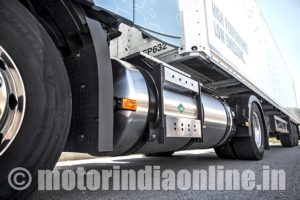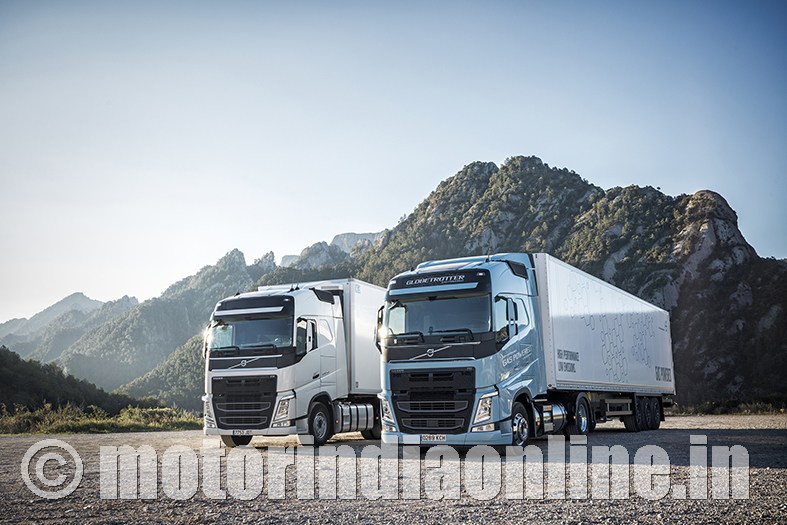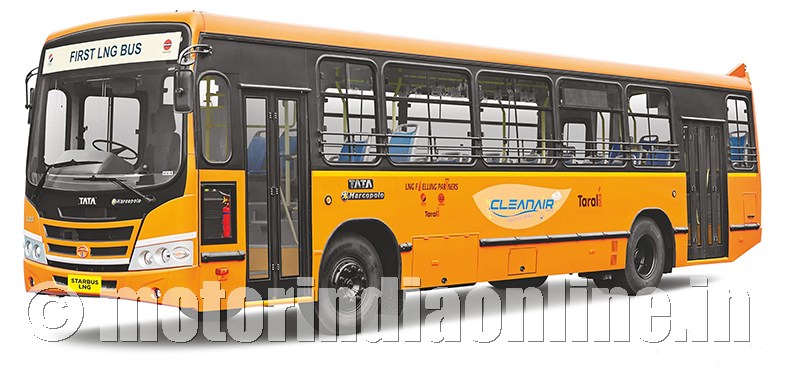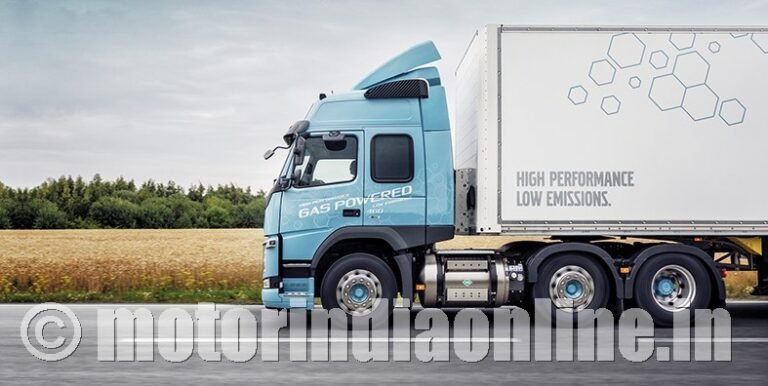Amid all the discussions about electrification in the transportation sector, global commercial vehicle manufacturers are stepping up their gears to mitigate the transportation industry’s climate impact! They are betting heavily on LNG or biogas (renewable natural gas) as a viable alternative to conventional diesel for regional and long-haul heavy transport operations, especially in Europe. They claim that LNG provides significant environmental and public health benefits with 20 per cent lower CO2 emissions compared to diesel, and even a 100 per cent emissions reduction using bio-based LNG, thus achieving sustainable and environmentally friendly transport. It also promises lower NOx emissions, with almost no particulate emissions, while the LNG-powered engines are said to be significantly quieter than conventional diesel engines.
Volvo Trucks, for example, has just unveiled its first gas-powered truck for the European market. The company is now working with gas suppliers and customers to expand the LNG infrastructure in Europe. “The EU is imposing stricter CO2 rules for heavy vehicles, and we see clear potential for increasing LNG market share as a vital part of the solution to reduce emissions,” says Lars Martinsson, director of environment and innovation at Volvo Trucks.
Volkswagen Group Logistics, in cooperation with Scania, is also promoting the promotion of LNG as a fuel for trucks. It has revealed that more than 100 LNG-powered trucks will be used on northern Germany’s roads in the future as a commitment to sustainable logistics. It is in dialogue with gas suppliers to build LNG refueling stations in the region. Scania claims that the LNG powertrain, apart from 20-90 per cent lower CO2 emissions than diesel engines depending on fuel choice, emits around 95 per cent less NOx. Particulate emissions during combustion are completely avoided by up to 95 percent, while noise levels are reduced by about 50 percent (-3 dB), according to the truck maker.
Italy-based IVECO, one of the industry’s leading natural gas transportation companies, has also introduced a 460 hp Stralis NP (Natural Energy) truck for long-haul operations. The brand claims to reduce carbon dioxide emissions by up to 95 percent by using compressed or liquefied biomethane as fuel. The company already supports an operating park of 22,000 natural gas vehicles across Europe.
Conventional natural gas is derived from fossil fuels and consists mostly of methane (CH4). Alternatively, renewable natural gas (RNG), also known as biomethane or biogas, can be produced from renewable means such as decomposed organic matter or biological waste. But to be used as a transportation fuel, natural gas must be either compressed (CNG) or liquefied (LNG). Notably, the primary source of natural gas defines its “cleaner” credentials.


The cost of alternative fuels (CNG and LNG) which can be produced locally is cheaper than diesel in many European countries and in India as well. Although CNG is widely used in passenger cars and buses, LNG meets the longer range requirements of trucks, as the liquid is denser than gas (CNG), and hence more energy can be stored in terms of volume in a given tank. Moreover, the carrying capacity of LNG vehicles is 2.5 times more than that of CNG.
Energy experts believe that the long-term availability of natural gas and its commercial viability are excellent at the global level. For example, biogas has so far only been produced in limited quantities in various parts of the world. As more and more gas-powered products emerge, alternative fuel production can be amplified locally in all markets.
“All in all, this makes LNG the best climate alternative widely available on the market for long and heavy transportation. What is needed now is a gas-powered truck that can compete with diesel in terms of performance and fuel consumption and the continued expansion of LNG infrastructure. In both cases, Making significant progress,” notes Volvo Trucks’ Martinson.
Volvo FM and FH LNG trucks on par with diesel trucks
Volvo Trucks has introduced Euro 6 heavy-duty trucks powered by LNG or biogas on the European market. The new Volvo FM LNG and Volvo FH LNG will go on sale in the first half of 2018, and are available with 420 or 460 hp and gross weights of up to 64 tons.


Interestingly, the new gas-powered trucks have the same performance, drivability and fuel consumption as their diesel counterparts, making them practical and economical for heavy-duty transportation. The 460 hp LNG engine delivers a maximum torque of 2,300 Nm, while the 420 hp unit generates 2,100 Nm, the same torque as diesel engines.
Volvo’s new LNG powertrain uses diesel cycle technology instead of the Otto cycle engine traditionally used in gas engines, thus ensuring no compromise on engine power and torque. A selective catalytic reduction system and particulate filter were put in place to treat the exhaust next.
To extend the driving range, LNG is stored in a cooled state at a pressure of 4-10 bar at a temperature of -140 to -125 °C inside the tank. Volvo offers a tank capacity of up to 1,000 km. Refueling times are no different from diesel. During driving, the fuel must be heated to a gaseous state before being injected into the engine. In order to ignite the gas, a small amount of diesel is added at the moment of injection. For maximum environmental compatibility, Volvo offers hydrogenated vegetable oils (HVOs) instead of conventional diesel.
LNG in India: A Revolution in Automotive Fuel?
There is a lot going on in the LNG space in India as well. In August, the Union government had notified revised gas cylinder standards for LNG stations with an aim to help create a storage and supply chain for refueling stations through ‘satellite trucks’, just like CNG stations in Delhi.


Local firm Tata Motors has taken the lead in LNG, with the introduction of the first LNG-powered bus, the Tata Marcopolo (LPO 1613) in Kerala late last year. In fact, the company was the first OEM here to launch a heavy-duty LNG truck, the Prima 4032.S, which was showcased at the Auto Expo 2014. The eco-friendly model and its affordable price make it a compelling alternative fuel for the company. LNG is also around 40% cheaper than diesel and around 15% more expensive than CNG.
Other domestic CV makers, including Ashok Leyland, Mahindra and BharatBenz, are also reported to be developing LNG variants for their products. For example, Scania has already introduced the ED95 engine series (Euro 4 compliant) in its products which can be run almost entirely on biofuels including CNG. On the LNG supply side, India’s largest LNG importer Petronet and Reliance Petroleum have expressed interest in offering LNG at fuel stations.
But the current debate in India on LNG is only about conventional natural gas, which is non-renewable and entirely imported. A cleaner approach is needed for LNG for vehicles by encouraging domestic and commercial production of biogas. The government and the automotive industry need to work together on this, in order to extract the real “environmental” benefits of using LNG in vehicles.





